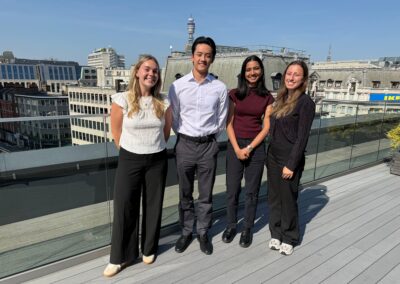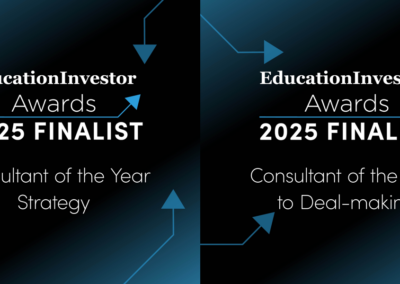Robert Paddock is one of the leading lights of digital education. He previously co-founded Getsmarter, an online platform providing short courses accredited by world-leading universities, which was acquired by 2U. He has now established the Valenture Institute, a global private online high school. They have recently raised $7m from the EdTech-focused VC fund GSV and are expanding rapidly, offering both fully online provision and blended learning provision with the development of boutique campuses.
Our managing partner, Rupert Barclay, was delighted to speak to him about Valenture’s online schooling model, the educational and economic benefits, and the potential for online and blended learning models over the next 10 years.
Watch the full interview here or read about the highlights of the conversation below
The Online Student Experience
Parents, students and teachers all around the world have had a hands-on experience with ‘remote schooling’ during the Covid pandemic. Rob, however, believes that the online experience has got to be designed from first-principles.
“The closest analogy [for bricks and mortar schools operating remotely] would be if you’ve got a petrol or diesel engine car and you try to retrofit an electric engine into it, versus a purpose built electric car”
Disaggregating the Role of the Teacher
At Valenture, they have taken steps to break-down the responsibilities of a teacher into separate roles, performed by specialists. They have individual roles for learning designers who create lesson content, lesson facilitators who deliver live lessons, tutors for small group and one-to-one intervention, and pastoral mentors who have psychology or counselling backgrounds.
“In South Africa, the department’s official job description includes 17 different discrete roles that a teacher needs to perform simultaneously. Any of us in a more corporate setting would look at that and say ‘we can’t expect one person to do all of those jobs’”.
Rob thinks the opportunity to disaggregate the role of the teacher also exists for brick and mortar schools, but that the challenge and imperative to do so is even more pronounced for online providers.
Synchronous and Asynchronous Digital Delivery
Traditional schools around the world have grappled, whilst operating remote learning, with what the optimal mix of synchronous (live) and asynchronous (self-paced and independent) learning is. At Valenture, the model is what Rob describes as ‘semi-synchronous’, with an approximate 50:50 split. He admits that to ally this with their approach of small class sizes makes it expensive to operate, so they are developing an alternative model.
“We are spooling up another version of our offering at the moment, which is going to be far more self-paced with target teacher and mentor intervention”
Rob discusses how learning analytics enables a personalised learning approach based upon mastery. This, in turn, allows Valenture to make teacher and mentor intervention more effective.
Valenture’s Blended Learning Campuses
Valenture have now opened two ‘boutique campuses’ in South Africa, with further sites planned in London and Boston. Rob admits that they didn’t start out with the intention to have physical real-estate, but have introduced them in response to parental demand.
“The market was saying ‘we love this curriculum, we love the high-touch support. But, is there somewhere I can drop my kids off during the day?’”.
At their campuses, students still do all of their learning online. Rob likens them to co-working spaces, where students are learning independently but in the same space with the associated social benefits and access to extracurricular activities.
He thinks there are great advantages, particularly in Africa to boutique, micro-schools, with the ability to host them in near enough any kind of building.
Implications for Public Education Systems
Rob detailed how Valenture have been operating a pilot project in partnership with the Western Cape Education Department. The micro-school is in Mitchells Plain, a deprived area in Cape Town, and hosts 30 students completing online learning with an on-site mentor.
One of Rob’s interesting insights is that he believes it is incumbent on the private enterprises to run pilots and ‘do the heavy lifting’ to encourage public education systems to innovate
“A view is that the best use of private and philanthropic funds in education is to fundamentally alter the way public money is spent in education.”
GSV’s Investment in Valenture
It was confirmed in September 2020 that GSV were completing a $7m investment in Valenture. Rob discusses why he accepted investment from GSV and how he views it as highly strategic investment. He encourages other entrepreneurs to consider the strategic benefits of their investment partners.
“When someone is invested in your business, you have their attention, and if that person has networks, has experience and so on, you can radically benefit from it in a way that amplifies and augments your capacity and ability as a business.”
EdTech in Africa
Rob also sits on the board of Injini, which describes itself as “Africa’s first EdTech incubator”. He is clearly passionate about the potential of blended learning to support the continent’s educational progress.
One area he is sceptical about is mobile learning. His reservation is simple – he believes that the screen real estate offered by a mobile is insufficient for learners’ needs.
“What I’m super excited about is the level of ingenuity when it comes to blended learning options that we’re seeing around Africa”.

